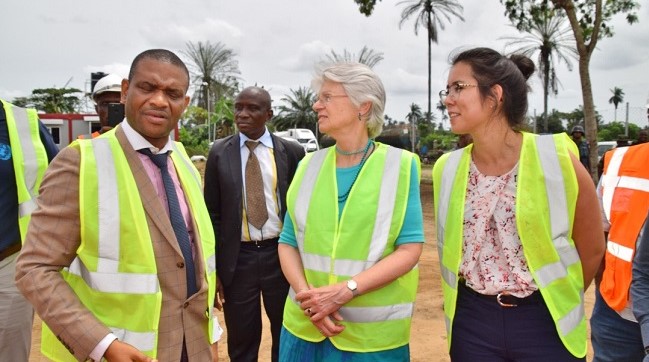The Netherlands Ambassador to Nigeria, Ms Marion Kappeyne, on Wednesday, May 8, 2019 said the country was ready to support Nigeria to clean-up decades-long oil spills in Ogoniland.

Kappeyne made the disclosure in Ebube while inspecting ongoing remediation of one of the polluted sites in Ebube community, Eleme Local Government Area of Rivers State.
She said the clean-up project was one of the Nigerian government’s top priorities that needed the support of all to succeed.
“I came to see things for myself rather than sitting in Abuja and just reading them in the newspapers.
“This part of the country (Niger Delta) is very important, and so, we are following things up to ensure the clean-up is a success,” she said.
She expressed confidence that the clean-up would be carried out in line with global best practice due to collaboration and supervision of the United Nations Environment Programme (UNEP).
“The people are assured that they are not forgotten, as we came to see how we can support the clean-up exercise.
“I understand the impatience as people want to see results in cleaning up of their lands. I can see that work is ongoing and hopefully it will produce results soon.
“However, it will be of no one’s interest that the lands which are being remediated get re-contaminated again,” she said.
Also speaking, the UNEP representative to Nigeria, Mike Cowing, said the global body was satisfied with biological processes being carried out in the Ebube remediation site.
He said that the Federal Government had re-engaged UNEP to strengthen the Hydrocarbon Pollution Remediation Project (HYPREP) for full implementation of the 2011 UNEP recommendations.
“The Ebube site is a site that is going to be less complex. When we move to the heavily contaminated sites, then we will face a more sophisticated remediation approach.
“For site of this nature, what I am seeing now is appropriate and in line with what I had expected.
Cowing said that UNEP had initiated some training courses and had taken members of the clean-up governing council to the United Kingdom (UK) for training.
“We took them to the UK to expose them to large remediation projects in the UK, so that they would have an understanding of how projects are done.
“The council members were exposed to the technology, planning, contractual relationship as well as compliance to legislation.
On his part, Dr Marvin Dekil, Project Coordinator of HYPREP, said that contractors handling the clean-up were already using one of the best soil treatment technologies, biocell, for the project.
According to him, biocell was a biological treatment facility that remedies contaminated soil with use of natural micro organisms.
“The contaminated soil is excavated and put into the biocell for bio-remediation treatment to take place. This allows the natural micro organism to degrade the contaminated soil.
“The micro organism degrades the contaminated soil to a level that would be good enough for us to return the soil back to where we took it from,” he said.
Dekil said the clean-up was the first time the Federal Government would be undertaking such task and, as such, was taking practical steps to ensure its success.
HYPREP in the Federal Ministry of Environment was set-up by the Federal Government to coordinate the clean-up of oil-rich but polluted Ogoniland.
By Desmond Ejibas
